选择性必修 二 Unit 2 Bridging Cultures - Assessing your progress(28张PPT)
文档属性
| 名称 | 选择性必修 二 Unit 2 Bridging Cultures - Assessing your progress(28张PPT) | 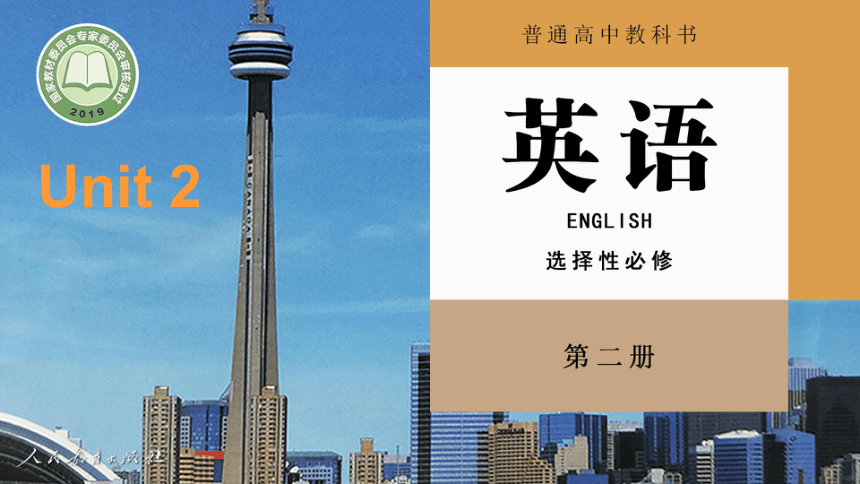 | |
| 格式 | pptx | ||
| 文件大小 | 2.4MB | ||
| 资源类型 | 试卷 | ||
| 版本资源 | 人教版(2019) | ||
| 科目 | 英语 | ||
| 更新时间 | 2022-01-28 15:46:28 | ||
图片预览

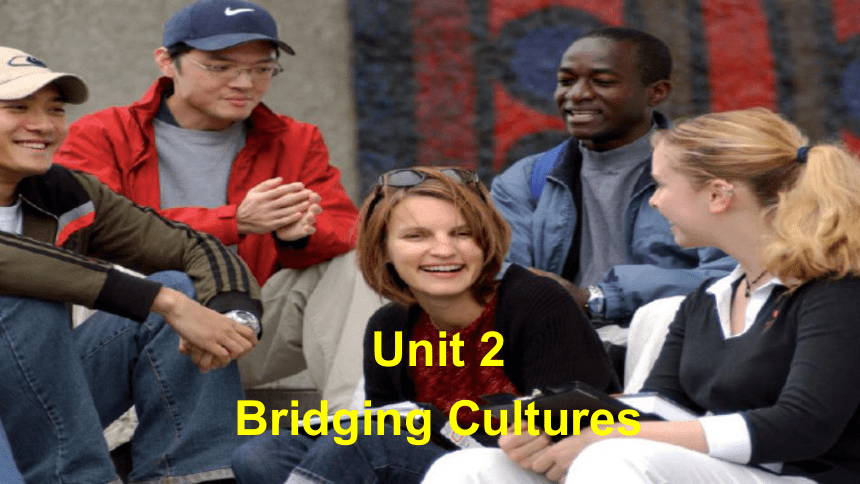
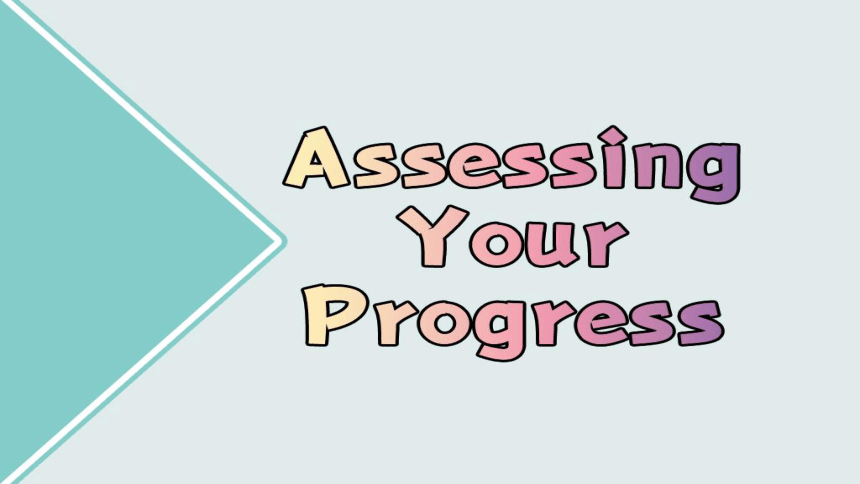
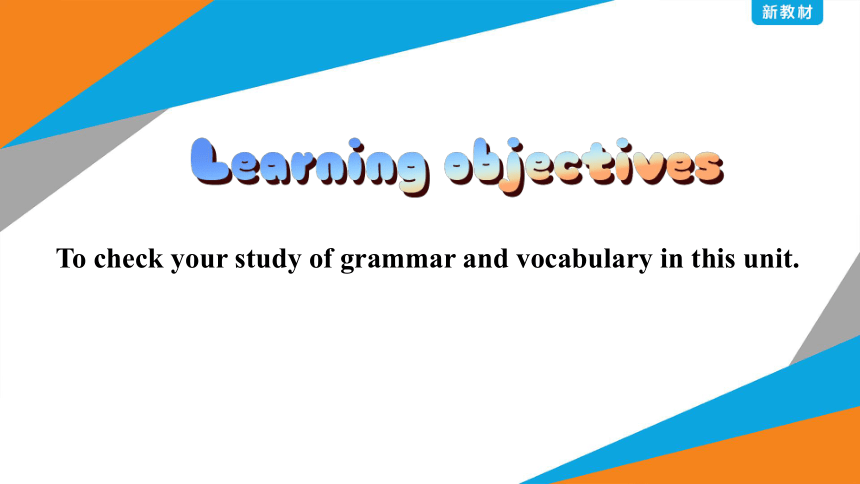
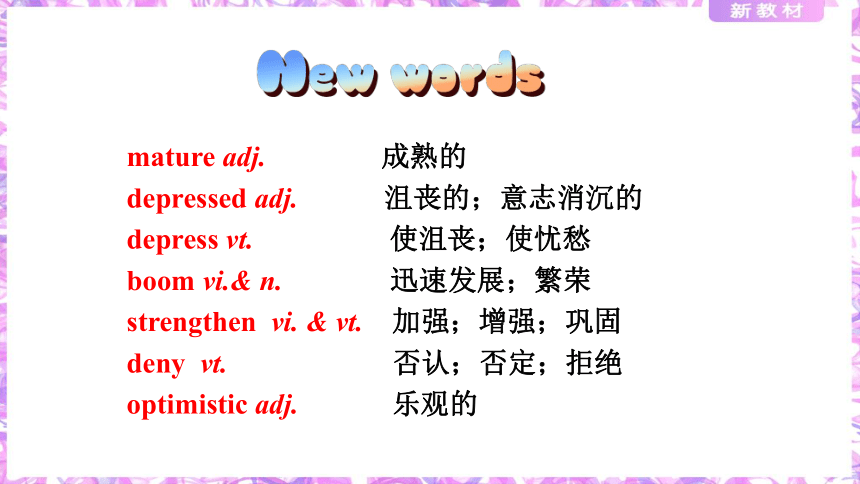
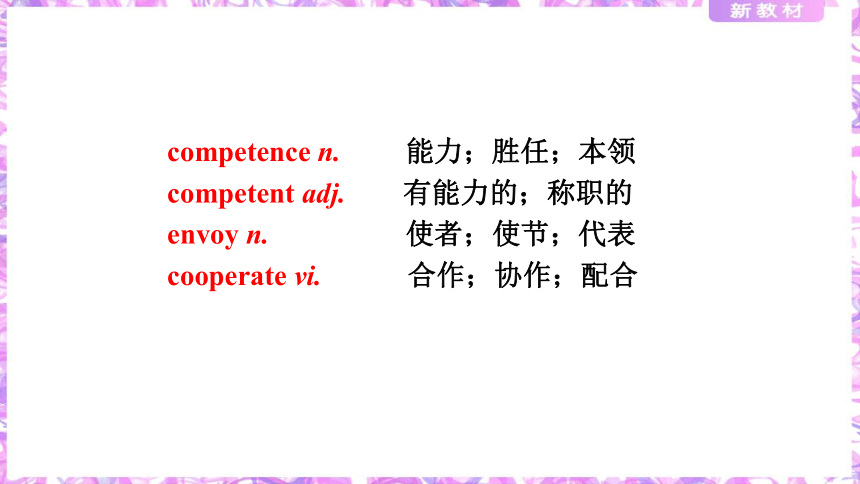
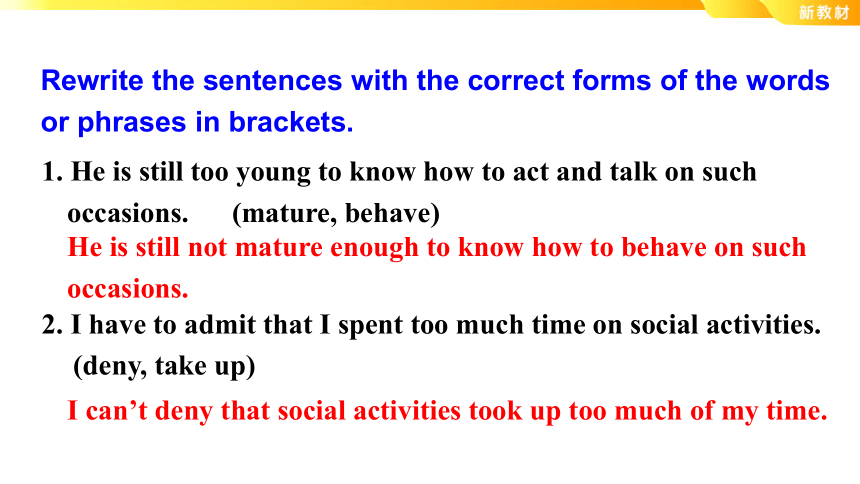
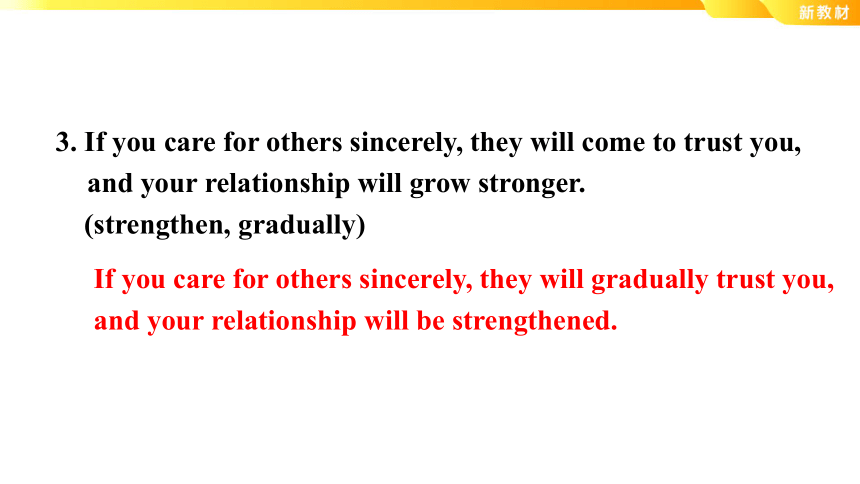
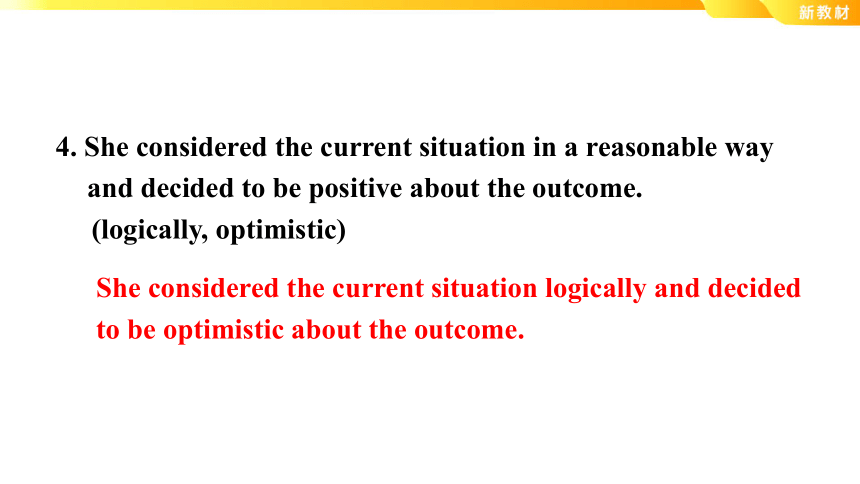
文档简介
(共28张PPT)
Unit 2
Unit 2
Bridging Cultures
To check your study of grammar and vocabulary in this unit.
mature adj. 成熟的
depressed adj. 沮丧的;意志消沉的
depress vt. 使沮丧;使忧愁
boom vi.& n. 迅速发展;繁荣
strengthen vi. & vt. 加强;增强;巩固
deny vt. 否认;否定;拒绝
optimistic adj. 乐观的
competence n. 能力;胜任;本领
competent adj. 有能力的;称职的
envoy n. 使者;使节;代表
cooperate vi. 合作;协作;配合
Rewrite the sentences with the correct forms of the words or phrases in brackets.
1. He is still too young to know how to act and talk on such occasions. (mature, behave)
2. I have to admit that I spent too much time on social activities. (deny, take up)
He is still not mature enough to know how to behave on such occasions.
I can’t deny that social activities took up too much of my time.
3. If you care for others sincerely, they will come to trust you, and your relationship will grow stronger.
(strengthen, gradually)
If you care for others sincerely, they will gradually trust you, and your relationship will be strengthened.
4. She considered the current situation in a reasonable way and decided to be positive about the outcome.
(logically, optimistic)
She considered the current situation logically and decided to be optimistic about the outcome.
5. Most of the people who had applied for this position were turned down, but he stood out because he was good at working with others. (applicant, cooperate)
Most of the applicants for this position were turned down, but he stood out because he was good at cooperating with others.
6. The mother worried about her daughter who was studying abroad in a totally new environment, but she felt less anxious because of the fact that people there were friendly and helpful. (surroundings, take comfort in)
The mother worried about her daughter who was studying abroad in totally new surroundings, but she took comfort in the fact that people there were friendly and helpful.
on such occasions 在这样的情况下
social activities 社会活动
take up 拿起;开始;从事;吸收;接纳;占去;继续做;做某事消遣
care for 关心;照看
in a reasonable way 以合理的方式
the current situation 现状
apply for 申请
in a totally new environment 在一个全新的环境里
take comfort in 从……中得到安慰
Match the phrases or clauses below to make complete sentences.
1. My suggestion for avoiding any cultural misunderstanding is …
2. No matter which country you go to, you will end up feeling like an outsider. That …
3. What he said about the school was ...
4. Taking a year off from school to travel abroad is …
5. What I saw when I arrived was …
6. That he was forgetting his mother tongue ...
7. Why the school denied his application is ...
8. Perhaps the most obvious challenge of studying abroad is …
9. I’m afraid ...
10. It remains to be seen ...
A beyond description.
B perfectly true.
C that you have to overcome the language barrier.
D still unknown.
E that I don’t know how to acknowledge all the sources in my research paper correctly.
F that you should observe what others do and how they do it.
G what’s generally called a gap year.
H is probably why many people do not want to live abroad.
I whether my research paper will be well received.
J worried him a bit.
5 – A
6 – J
4 – G
7 – D
1 – F
2 – H
3 – B
8 – C
10 – I
9 – E
Complete the passage with the correct forms of the words in the box. Did the writer think it was a good idea to study abroad Why
gain, cooperation, strength, angle, surround, depress, behave, competent, dramatic
Studying abroad in Amman, Jordan, was a life changing experience for me. Every day was an adventure because life there was ___________ different from that at home.
dramatically
As you know, Jordan is in the Middle East. There were so many challenges and cultural norms I had to adapt to, and I needed to learn how to __________ in new _____________and ___________ with people from different cultural backgrounds. Fortunately, everyone I met there was understanding and welcoming.
behave
surroundings
cooperate
gain, cooperation, strength, angle, surround, depress, behave, competent, dramatic
I applied through International Studies Abroad (ISA), and they were incredibly helpful and made the process less ___________ and overwhelming. Studying abroad let me see things from new ___________ and learn more about cultures around me.
depressing
angels
gain, cooperation, strength, angle, surround, depress, behave, competent, dramatic
I hope everyone gets the opportunity to pursue further studies abroad and to _________ an understanding of different cultures, too. l believe studying abroad can help you ____________ your abilities in cross-cultural communication and improve your general ___________.
gain
strengthen
competence
gain, cooperation, strength, angle, surround, depress, behave, competent, dramatic
Complete the passage about culture shock with the words from the box. What are the four stages of it How do you think people can overcome culture shock
what, that, who, when, whatever, because
_____ people move to a new country they often feel worried and stressed _______ they don’t know the customs and traditions of the new place. This feeling is _____ is generally called “culture shock”.
When
because
what
Kalervo Oberg was the one ____ first used this phrase. According to Oberg, there are several stages of culture shock. First there is the honeymoon period. During this period, _________ people experience is fresh and exciting to them. In the next stage, frustration, people notice more differences between their own culture and the new one.
who
whatever
what, that, who, when, whatever, because
_____ people usually do about these differences is either to change their behaviour or return to their home country. If people stay, they come to the third stage which occurs ______ they begin to adjust to the new culture. They begin to become familiar with the customs, the thinking, and the habits of the new place.
What
when
what, that, who, when, whatever, because
Acceptance is the fourth stage. People finally begin to fit into the new culture. Differences no longer trouble them as much and they feel _____ they might belong to the new place.
that
what, that, who, when, whatever, because
What have you learnt in this unit about the benefits of cultural exchange
What do you think are some of the differences between studying in your own country and studying abroad
If there are overseas students visiting your school, can you use what you have learnt to communicate with them
Overall, I thought this unit was
cool helpful so-so difficult
Reflecting
Complete the activities on Page 69.
Unit 2
Unit 2
Bridging Cultures
To check your study of grammar and vocabulary in this unit.
mature adj. 成熟的
depressed adj. 沮丧的;意志消沉的
depress vt. 使沮丧;使忧愁
boom vi.& n. 迅速发展;繁荣
strengthen vi. & vt. 加强;增强;巩固
deny vt. 否认;否定;拒绝
optimistic adj. 乐观的
competence n. 能力;胜任;本领
competent adj. 有能力的;称职的
envoy n. 使者;使节;代表
cooperate vi. 合作;协作;配合
Rewrite the sentences with the correct forms of the words or phrases in brackets.
1. He is still too young to know how to act and talk on such occasions. (mature, behave)
2. I have to admit that I spent too much time on social activities. (deny, take up)
He is still not mature enough to know how to behave on such occasions.
I can’t deny that social activities took up too much of my time.
3. If you care for others sincerely, they will come to trust you, and your relationship will grow stronger.
(strengthen, gradually)
If you care for others sincerely, they will gradually trust you, and your relationship will be strengthened.
4. She considered the current situation in a reasonable way and decided to be positive about the outcome.
(logically, optimistic)
She considered the current situation logically and decided to be optimistic about the outcome.
5. Most of the people who had applied for this position were turned down, but he stood out because he was good at working with others. (applicant, cooperate)
Most of the applicants for this position were turned down, but he stood out because he was good at cooperating with others.
6. The mother worried about her daughter who was studying abroad in a totally new environment, but she felt less anxious because of the fact that people there were friendly and helpful. (surroundings, take comfort in)
The mother worried about her daughter who was studying abroad in totally new surroundings, but she took comfort in the fact that people there were friendly and helpful.
on such occasions 在这样的情况下
social activities 社会活动
take up 拿起;开始;从事;吸收;接纳;占去;继续做;做某事消遣
care for 关心;照看
in a reasonable way 以合理的方式
the current situation 现状
apply for 申请
in a totally new environment 在一个全新的环境里
take comfort in 从……中得到安慰
Match the phrases or clauses below to make complete sentences.
1. My suggestion for avoiding any cultural misunderstanding is …
2. No matter which country you go to, you will end up feeling like an outsider. That …
3. What he said about the school was ...
4. Taking a year off from school to travel abroad is …
5. What I saw when I arrived was …
6. That he was forgetting his mother tongue ...
7. Why the school denied his application is ...
8. Perhaps the most obvious challenge of studying abroad is …
9. I’m afraid ...
10. It remains to be seen ...
A beyond description.
B perfectly true.
C that you have to overcome the language barrier.
D still unknown.
E that I don’t know how to acknowledge all the sources in my research paper correctly.
F that you should observe what others do and how they do it.
G what’s generally called a gap year.
H is probably why many people do not want to live abroad.
I whether my research paper will be well received.
J worried him a bit.
5 – A
6 – J
4 – G
7 – D
1 – F
2 – H
3 – B
8 – C
10 – I
9 – E
Complete the passage with the correct forms of the words in the box. Did the writer think it was a good idea to study abroad Why
gain, cooperation, strength, angle, surround, depress, behave, competent, dramatic
Studying abroad in Amman, Jordan, was a life changing experience for me. Every day was an adventure because life there was ___________ different from that at home.
dramatically
As you know, Jordan is in the Middle East. There were so many challenges and cultural norms I had to adapt to, and I needed to learn how to __________ in new _____________and ___________ with people from different cultural backgrounds. Fortunately, everyone I met there was understanding and welcoming.
behave
surroundings
cooperate
gain, cooperation, strength, angle, surround, depress, behave, competent, dramatic
I applied through International Studies Abroad (ISA), and they were incredibly helpful and made the process less ___________ and overwhelming. Studying abroad let me see things from new ___________ and learn more about cultures around me.
depressing
angels
gain, cooperation, strength, angle, surround, depress, behave, competent, dramatic
I hope everyone gets the opportunity to pursue further studies abroad and to _________ an understanding of different cultures, too. l believe studying abroad can help you ____________ your abilities in cross-cultural communication and improve your general ___________.
gain
strengthen
competence
gain, cooperation, strength, angle, surround, depress, behave, competent, dramatic
Complete the passage about culture shock with the words from the box. What are the four stages of it How do you think people can overcome culture shock
what, that, who, when, whatever, because
_____ people move to a new country they often feel worried and stressed _______ they don’t know the customs and traditions of the new place. This feeling is _____ is generally called “culture shock”.
When
because
what
Kalervo Oberg was the one ____ first used this phrase. According to Oberg, there are several stages of culture shock. First there is the honeymoon period. During this period, _________ people experience is fresh and exciting to them. In the next stage, frustration, people notice more differences between their own culture and the new one.
who
whatever
what, that, who, when, whatever, because
_____ people usually do about these differences is either to change their behaviour or return to their home country. If people stay, they come to the third stage which occurs ______ they begin to adjust to the new culture. They begin to become familiar with the customs, the thinking, and the habits of the new place.
What
when
what, that, who, when, whatever, because
Acceptance is the fourth stage. People finally begin to fit into the new culture. Differences no longer trouble them as much and they feel _____ they might belong to the new place.
that
what, that, who, when, whatever, because
What have you learnt in this unit about the benefits of cultural exchange
What do you think are some of the differences between studying in your own country and studying abroad
If there are overseas students visiting your school, can you use what you have learnt to communicate with them
Overall, I thought this unit was
cool helpful so-so difficult
Reflecting
Complete the activities on Page 69.
